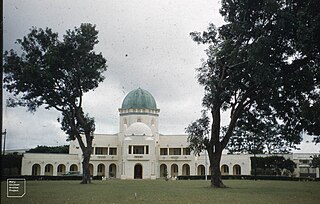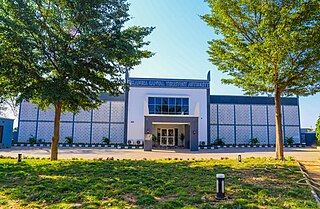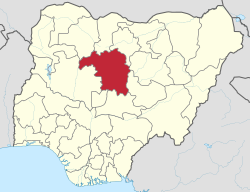
Kaduna is the capital city of Kaduna State, and the former political capital of Northern Nigeria. It is located in north-western Nigeria, on the Kaduna River. It is a trade center and a major transportation hub as the gateway to northern states of Nigeria, with its rail and important road network.

Kaduna State is a state in the northwest geopolitical zone of Nigeria. The state capital is its namesake, the city of Kaduna, which was the 8th largest city in the country as of 2006. Created in 1967 as North-Central State, which also encompassed the modern Katsina State, Kaduna State achieved its current borders in 1987. Kaduna State is the fourth largest and third most populous state in the country, Kaduna State is nicknamed the Centre of Learning, owing to the presence of numerous educational institutions of importance within the state such as Ahmadu Bello University.

Nasir Ahmad El-Rufai is a Nigerian politician who served as governor of Kaduna State from 2015 to 2023. He served as minister of the Federal Capital Territory from 2003 to 2007. El-Rufai also served as director of the Bureau of Public Enterprises. He is a co-founding member of the ruling party All Progressives Congress.
Mukhtar Ramalan Yero is a Nigerian politician who served as the governor of Kaduna State from 2012 to 2015, following the death of Patrick Yakowa in a helicopter crash. He previously served as deputy governor from 2010 to 2012 and as Kaduna State Commissioner of Finance from 2007 to May 2010 when Yakowa named him deputy governor after he succeeded Namadi Sambo who became the vice president of Nigeria.
Muhammad Sani Abdullahi popularly known as Dattijo is a Deputy Governor of Economic Policy at the Central Bank of Nigeria. President Bola Ahmed Tinubu appointed Muhammad as Deputy Governor on 15 September 2023, and his appointment was confirmed by the Nigerian Senate on 23 September, 2023. Dattijo served as a policy adviser at the Executive Office of United Nations Secretary General Ban Ki Moon in New York. Dattijo formed the core team that developed the Sustainable Development Goals (SDGs). Dattijo resigned from this appointment to serve the Nigerian government as the Commissioner for Budget and Planning in Kaduna State. He published a book titled "Disruption Rethinking Governance to work for the Poor." On 2 July 2023.

Uba Sani is a Nigerian engineer and politician who is the current governor of Kaduna State since 2023. He previously served as the Senator representing Kaduna Central senatorial district from 2019 to 2023.
Hadiza Sabuwa Balarabe is a Nigerian politician and medical doctor who has served as deputy governor of Kaduna State since 2019. She is the first female deputy governor of the state and was elected during the 2019 Nigerian gubernatorial elections held in March, under the platform of the ruling All Progressives Congress and re-elected in 2023.
Samuel Aruwan is a Nigerian journalist, and pioneer Commissioner for Kaduna State Ministry of Internal Security and Home Affairs.
Clement Okechukwu Nwankwo is a lawyer and human rights activist in Nigeria. He is the Executive Director of Policy and Legal Advocacy Centre and convener of Civil Society Situation Room (PLAC). He is recognised as the first Nigerian to establish a human rights organisation.
Atyap Chiefdom is a Nigerian traditional state of the Atyap people, located on the upper Kaduna River basin of the central Nigeria plateau in the Middle Belt. Its headquarters is at A̠tak Njei, Zangon Kataf, southern Kaduna state, Nigeria.
Tagwai Sambo is the monarch of Asholyio (Moroa) Chiefdom with headquarters at Manchok, a Nigerian traditional state in southern Kaduna State, Nigeria. He is also known by the title "Chief of Moro'a (Asholyio)".
Aisha Dikko is the former attorney general and Commissioner of Justice for Ministry of Justice. She was sworn as attorney general and Commissioner of Justice of Kaduna State on 12 July 2019 under the governance of Nasir Ahmad el-Rufai.
Balaraba Aliyu Inuwa is the commissioner of Public Works and Infrastructure for Kaduna State, Nigeria. She was appointed by Nasir Ahmad el-Rufai.
Fausat Adebola Ibikunle is the commissioner of Ministry of Housing and Urban Developments and was the general manager of the Kaduna State Urban Planning & Development Authority (KASUPDA). She is appointed by the Governor of Kaduna State Mallam Nasir Ahmad el-Rufai.
The 2019 Kaduna State gubernatorial election occurred on March 9, 2019. APC candidate Nasir Ahmad el-Rufai defeated main opposition party PDP's candidate, Isah Ashiru, to emerge winner of the contest. APC was said to have won 14 LGAs, PDP nine.
The 2023 Kaduna State gubernatorial election will take place on 18 March 2023, to elect the Governor of Kaduna State, concurrent with elections to the Kaduna State House of Assembly as well as twenty-seven other gubernatorial elections and elections to all other state houses of assembly. The election—which was postponed from its original 11 March date—will be held three weeks after the presidential election and National Assembly elections. Incumbent APC Governor Nasir Ahmad el-Rufai is term-limited and cannot seek re-election to a third term.

The 2023 Nigerian Senate elections in Kaduna State will be held on 25 February 2023, to elect the 3 federal Senators from Kaduna State, one from each of the state's three senatorial districts. The elections will coincide with the 2023 presidential election, as well as other elections to the Senate and elections to the House of Representatives; with state elections being held two weeks later. Primaries were held between 4 April and 9 June 2022.

Kaduna Capital Territory Authority (KCTA) is one of the three Kaduna Metropolitan Authorities in Kaduna state, Nigeria. The authority oversees 4 out of 23 local governments in Kaduna state, namely; Kaduna North, Kaduna South, Chikun and Igabi local government areas. In 2021, the law that established Kaduna Capital Territory Authority was passed. Kaduna Capital Territory Authority was formerly called Kaduna Local Government Authority after Kaduna city was made the capital of the state in 1937. The local government authority was a creation of the British colonial rule to oversee taxation, the production of food crops and export to Britain. The authority was first headed by District Head, Aminu Sambo in 1937. The current administrator of Kaduna Capital Territory Authority is Samuel Aruwan.
The immediate origins of the genocidal killings in Southern Kaduna especially in the 2010s and early 2020s can be traced to the events that brought in Goodluck Jonathan into power in 2010 as the President of Nigeria, and escalated after the presidential election in 2011, which he won.






